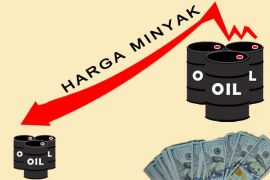"Inflation means the prices of basic necessaries consumed by the majority of the people are affected. If an inflation hike occurs beyond expectations it will be the people who will suffer," the head of the finance ministry`s fiscal policy bureau, Bambang PS Brodjonegoro, said.
He said a budget issue was not a mere economic problem but also a political process or decision which sometimes could not be explained using basic economic concepts.
He referred to the experience in 2010 when the government and Bank Indonesia (central bank) agreed to set the target of inflation at 5.3 percent.
Until the third quarter of 2010 all parties were still optimistic that the target would be met but prior to the fourth quarter an unexpected condition emerged namely energy and food price hike which the government was not ready to meet it as it never expected it, he said.
At the time the inflation reached almost 7.0 percent or to be exact 6.9 percent. The government then responded by implementing a tighter policy in the first semester of 2011.
"The rate of inflation from January 1 to June 20 was quite relieving as it just reached 1.06 percent. However we must not forget that inflation hike may possibly occur in the second semester due to seasonal factors such as post-fasting festivities or commodity prices that may be difficult to drop including energy and food prices," he said.
He said the government viewed that the inflation rate had tob e controlled and so if it produced a policy on subsidized fuel prices it was feared it would cause the rate of inflation to rise and become uncmanageable.
He said in case of a inflation hike it would be the common people that would suffer as prices would rise to reduce their buyng power.
"This is perhaps the reason why the subsidized fuel price issue is not yet a priority," he said.
He said the recent hike in the prices of rice and several other commodities had indeed been expected as it always happens every year.
He said in the second semester harvests have been over and so the price of rice would rise.
He said the government had to closely minitor inflation although it had reached only 1.06 percent in the first semester because the potential ahead was inflation not deflation.
Bambang admitted in the future the state budget quality needed to be improved so that more people who still live in hardships could enjoy the subsidy.
"The subsidy in the revised 2011 budget is already above Rp230 trillion, up from below Rp200 trillion before including that energy and non-energy subsidy while total spending is only Rp1,300 trillion," he said.
He said the present subsidy did not meet the target because it was price-based so that many people who did not deserve also enjoyed it.
(Uu.H-YH/HAJM/A014)
Editor: Priyambodo RH
Copyright © ANTARA 2011









